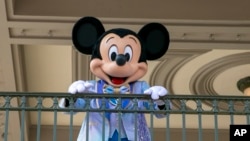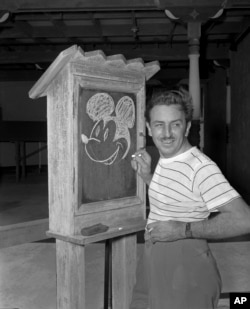An early version of Mickey Mouse, the famous Disney character, will soon belong to you, me and everybody else.
The mouse that started a Hollywood empire, along with several other characters, movies, and books will enter the public domain on January 1st.
Public domain is the term to describe creative works that are no longer protected by U.S. copyright law. Once a work enters the public domain, it can legally be shared, performed, reused, or repurposed without permission or cost.
Mickey Mouse, and Minnie Mouse, first appeared publicly in the 1928 film Steamboat Willie. Copyright law at the time provided protection for 75 years. But in 1998, U.S. law extended copyright protection for another 20 years.
Jennifer Jenkins is head of Duke University’s Center for the Study of Public Domain. Jenkins says copyright law is sometimes called the Mickey Mouse Protection Act. As the character is about to enter the public domain, she says “This is it. This is Mickey Mouse. This is exciting because it’s kind of symbolic.”
In a statement, the Disney Company told The Associated Press, “Ever since Mickey Mouse’s first appearance in the 1928 short film Steamboat Willie, people have associated the character with Disney’s stories, experiences, and authentic products.” The company added, “More modern versions of Mickey will remain unaffected by the expiration of the Steamboat Willie copyright,…”
People will only be able to use the version of the mouse in Steamboat Willie that has become public. However, observers expect the courts to be busy in the coming years judging what is inside and outside Disney’s ownership.
Disney also holds a trademark on Mickey to represent the company and its brand. That law bars the use of the character as a Disney product identifier for anyone except Disney.
Others in the public domain
Another famous animal character, Tigger, will also join his friend Winnie the Pooh in the public domain. The bouncing tiger first appeared in the book The House at Pooh Corner by British writer A.A. Milne. It turns 96 in January.
The silly old bear Pooh, himself, became public property two years ago when Milne’s book Winnie the Pooh came of age. The soft-spoken bear, no longer protected by copyright, is seen terrorizing women in this year’s horror film Winnie the Pooh: Blood and Honey.
Other creative works entering the U.S. public domain are Charlie Chaplin’s film Circus, Virginia Woolf’s book Orlando, and Eugene O’Neill’s play Long Day’s Journey into Night.
I'm Caty Weaver.
Hai Do adapted this story for VOA Learning English based on reporting from The Associated Press.
_____________________________________________
Words in This Story
empire - n. a large group of businesses under the control of one person or company
authentic - adj. real, true and accurate
symbolic - adj. representing an idea or quality
expiration - n. the fact of coming to an end or no longer valid







Forum